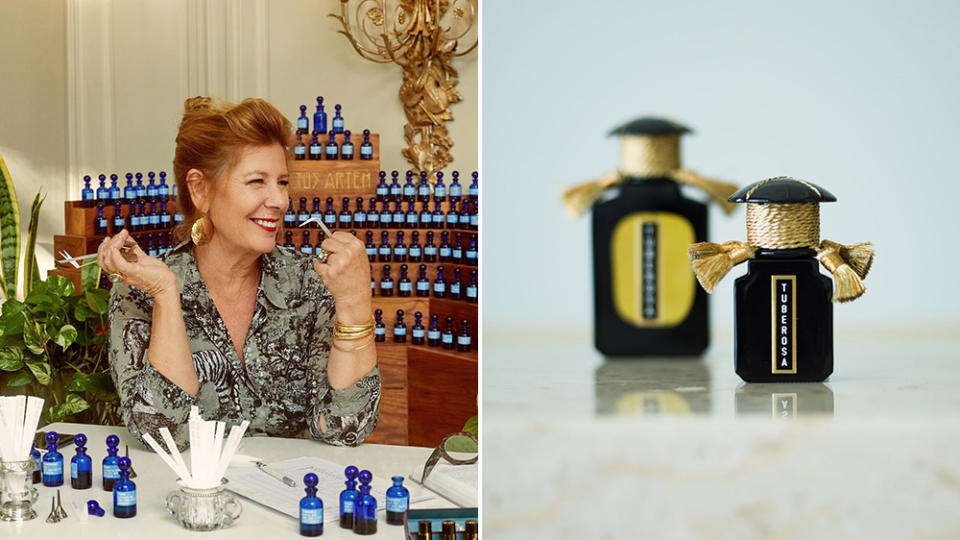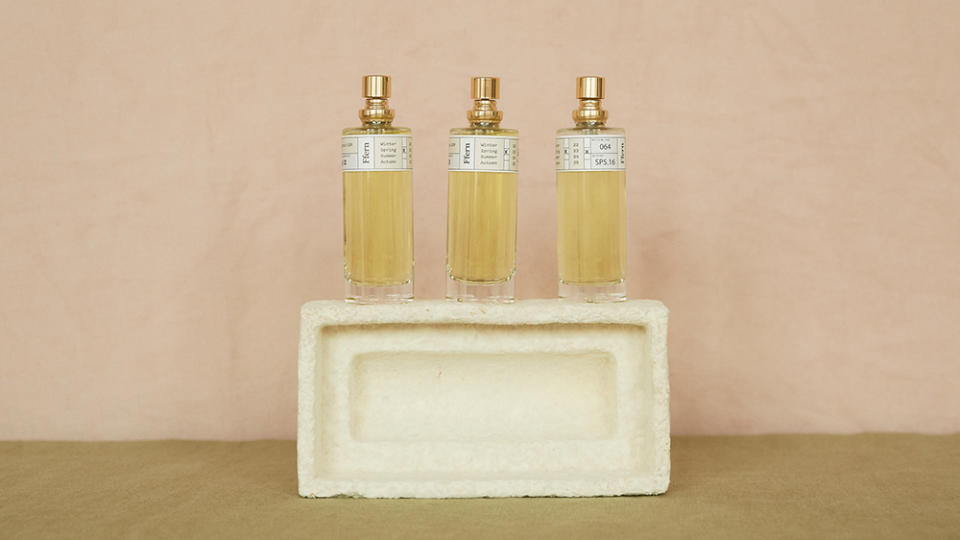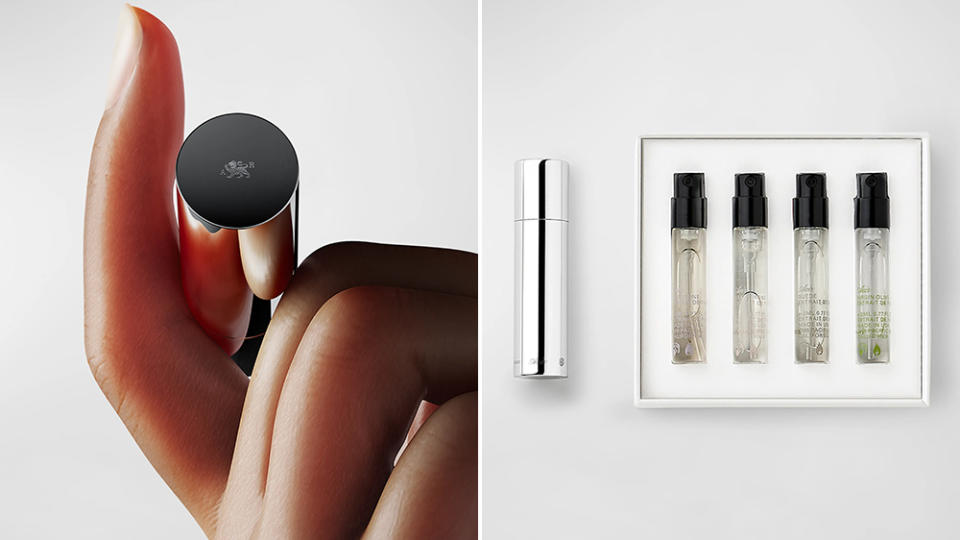A New Class of Eco-Conscious Fragrance Makers Wants to Make Your Cologne More Green

Grooming brands have always attempted to make their mark in unique ways, whether through impressive ingredient lists, remarkable packaging, or off-beat fragrance notes. But while the industry remains hard at work creating products to make us smell and feel our best, it also generates massive amounts of waste at every step of the process—formulation, testing, packaging, returns and expirations. More than 120 billion units of packaging are produced by personal care and beauty brands every year, according to the British recycling program TerraCycle. That doesn’t even account for other wasted ingredients, or the carbon footprint of both sourcing and shipping.
Fortunately, names have begun to emerge in the luxury fragrance space, from small boutique brands to well-known fashion houses such as Gucci and Calvin Klein, with a genuine commitment to sustainability, seeking to make their mark in a new way: with an informed approach that focuses on renewable packaging, minimal waste, and ethical sourcing.
“We overproduce in this country, we overuse and we throw stuff away,” says Holly Tupper, above, founder of the San Antonio-based fragrance and skincare line Cultus Artem. “It’s part of a holdover from our addiction to the notion that we have to have a new shiny thing, and really one of the major core tenants of Cultus Artem is thinking about how we create luxury, but in the framework from a different time when luxury was something that was unique and precious, and we didn’t have hundreds of them.”

In any industry, the word sustainability draws a mixed reaction, thanks to the unfortunate practice of “greenwashing”—a term coined for those who feign a commitment to lessening their carbon footprint. Instead, these companies use market research to craft packaging and product descriptors that imply sustainable efforts with no true backing to the claim—the exact things that climate-minded perfumers such as Tupper seek to separate themselves from in their practices.
Click here to read the full article.
“My trigger is words like ‘sustainability’ and ‘green’ and all this kind of stuff,” Tupper says. “There’s an awful lot of head scratching and endless meetings over the verbiage that we use to talk about our concern for the environment and how we manage it within our companies, but really, it’s all about waste.”
Because there aren’t exact terms and conditions a company must meet to purport sustainable efforts, greenwashing makes it difficult for the consumer to deduce what to buy, whom to support, and where the true crossroads of sustainability and luxury lie. It helps that a new guard of boutique fragrance houses is threading true practices of sustainability into the ethos of their company, from sourcing to transportation, packaging, and stocking. For them, sustainability isn’t a bone to throw the marketing department, it’s their driving force, and in some instances, their identity.
“We started Altra with a really clear goal in being as mindful as possible in all our choices in sourcing, manufacturing, and packaging our scents,” says the British brand’s founder and perfumer Beckielou Brown. “At the time, we were developing the brand and were deep in R&D, sustainability in packaging was not yet accessible to small independent brands like ours, so we really had to think creatively about how best to achieve our goals. We felt like so much of what was out there was greenwashing, and made a commitment to what we call our ‘Profuture’ vision, to take mindful, responsible actions at every step of our process.”
The Perfect Package

One aspect of fragrance that many independent fragrance houses have been tackling since their inception is how to create more sustainable packaging, typically through means of making their bottles refillable. Altra’s glass bottles are infinitely refillable, while a soon-to-launch first line by perfumer Aeir eliminates glass entirely in favor of aluminum.
“What is important to understand is the infrastructure and the system around us,” says Aeir co-founder Rodrigo Caula. “So, it’s not useful to force something that is not ready. For example, we use aluminum, not because it’s the most ‘bio material,’ but because it’s the most easily recyclable material. There is a system in place that allows people to recycle it, so we can take our bottles and upcycle or recycle them as many times as we want. With a lot of the new bio-materials, they are amazing, but there is not yet a system that can process them and them, so they end up in a landfill. I like to understand and work together with the system, instead of against.”
A common throughline for the sustainable fragrance industry is minimalism—a mindset and aesthetic that is also fortunately on trend. Cultus Artem’s take on the principle comes into play with its packaging, which Tupper created to minimize the potential amount of wasted product. Rather than create several different bottles for each SKU, she and her team worked hard to find a bottle design that could work for their entire product range, and they only print on the sleeve of the bottle rather than the box itself, so that it doesn’t become bound to any particular number or product and can easily be reused.
“The same thing is true of our skincare collection,” says Tupper. “The only thing that’s actually printed on the glass bottles is the logo, but what the product is on the inside, that’s a label that can be affixed, so we’ve been extremely mindful about our use of materials plus, we only use one bottle shape and one actuator for three different textures.”
British fragrance brand Ffern takes a slightly different approach, blending a limited amount of one genderless eau de parfum each season. Their coveted fragrances are made-to-order and often sell out quickly. To further reduce waste, traditional packaging is eschewed in favor of a biodegradable casing made of mycelium, a fungus, as well as agricultural materials. Those running out of houseplants can later use the material to propagate seeds.
Sustainable Sourcing

The bottle itself is one thing, but it’s what’s inside that truly makes a fragrance covetable. Vetiver, sandalwood, patchouli—it all has to come from somewhere. When it comes to delicate floral fragrances, the eau de parfum you spray from your bottle might have originated from thousands of flowers. For instance, it takes nearly 300,000 individual rose petals to produce just 5 milliliters of the precious fragrance oil.
Today, sustainably minded brands are taking a diversity of approaches to securing source material that is ethical, less wasteful, and still beautifully scented. Many have taken a relatively traditional approach of ethical sourcing of materials from nature, calling once again upon the ideals of minimalism to craft fragrances that shine a spotlight on a limited number of high-quality ingredients.
Cultus Artem fragrances typically zero in on one note, such as Tuberosa or Champaca, as does Matière Première, a perfume house by Aurélien Guichard, the nose behind popular fragrances such as Gucci Guilty and Narciso by Narciso Rodriguez. Guichard not only grows some of the plants he uses for his perfumes using organic and cruelty-free production methods, but also collaborates with ethical partners.
Even larger houses are also taking up the torch with environmentally conscious releases: Calvin Klein with its new CK EVERYONE, Chloé with Rose Naturelle Intense and Eau de Parfum Naturelle, and Lancôme Idôle, part of L’Oreal’s ‘Solidarity Sourcing’ program, to name a few.
Others have decided to try the scientific method, working with biotech companies such as Conagen to develop clean and cost-effective “natural” fragrance ingredients from inside a lab. The evolution of synthetic biology has allowed such companies to create mimics of the real thing, such as methyl jasmonate—a fragrance that evokes the same tea-like, moon-blooming scent of white jasmine petals—as well as a musk alternative that eliminates the need to source from animals.
It’s the same approach taken by the new guard, futuristic boutique brands such as Aeir, which worked with a biochemist to bring its first discovery set to life, featuring 100 percent synthetic fragrances such as Wet Stone and Virgin Olive.
“Palo Santo, for instance, doesn’t yield valuable oil until it’s around 80 years old,” explains Aeir co-founder Enrico Pietra of his reasoning to go fully synthetic from the get-go. “If you have to chop down a decades-old tree just to extract [its fragrance], it’s not the most sustainable. Regardless of how amazing your packaging might be, or how you’ve reduced your carbon footprint by not using glass, I think at the end of the day it really starts with what you’re putting inside the bottle, which is the product.”
While there’s no end-all-be-all method to sustainability when it comes to the fragrance industry, or the grooming industry as a whole, the pioneers in this space are forging a new path toward a more ethical and less wasteful future. Now, rather than a reliance on rare ingredients without regard for their origin, the future of fragrance encompasses both futuristic notions of innovation and a comforting return to the simplistic.
Best of Robb Report

